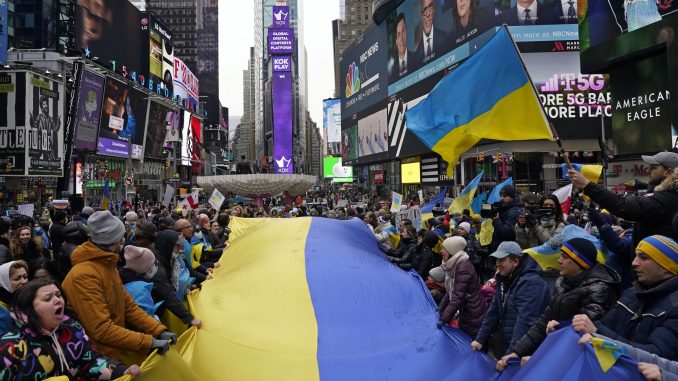
By Radwan Farraj
On Thursday, Feb. 25, Russia invaded Ukraine after several years of violent tensions. President Vladimir Putin initiated military action after weeks of amassing Russian forces on the Ukrainian border with Belarus and Russia.
Nearly 200,000 troops assembled on the Ukrainian border after nearly eight years of bloody war between Ukrainian government forces and Russian-backed separatist forces that occupy the easternmost regions of Donetsk and Luhansk, according to the New York Times. These regions, which identify as the Donetsk’s People’s Republic and Luhansk People’s Republic respectively, have fallen under the watch of Russian military forces, which Putin has claimed have been put in place as “peacekeepers.”
Putin alleged on Russian state television that the current Ukrainian government committed genocide against the Russian peoples living in these two regions, and that the aim of this military action is “to demilitarize and ‘denazify’ Ukraine,” according to a transcript published by Bloomberg. Ukrainian President Volodymyr Zelenskyy has made it clear that Ukraine would defend itself in the face of Russian threats and expressed his desire for peace.
In a speech addressed to both Ukrainian citizens and citizens of the Russian Federation on Feb. 22, Zelenskyy made his case against the war, saying, “But our main goal is peace in Ukraine and the safety of our people, Ukrainians. For that we are ready to have talks with anybody, including you [Russian polity], in any format, on any platform.”
Following rising tensions in recent months about the potential for Ukraine to become a member of the North Atlantic Treaty Organization, Russia expressed fears that Ukrainian membership in NATO would put their national security in question. Fears of NATO membership and the alleged presence of neo-Nazis in Ukraine’s government have acted as Putin’s justification for invasion.
The invasion of Ukraine has raised concerns throughout the world, with world powers imposing heavy sanctions and updating their foreign policies to brace for what could come as a result of the conflict. The most heavy hitting sanctions so far have not only targeted Russian industries, but Russian oligarchs and their bank accounts located in financial institutions around the world.
The economic sanctions targeting Russia already had negative effects on the Russian economy, with the Russian ruble depreciating at a rapid rate, causing an inflationary crisis. Access to SWIFT, an international banking system crucial for business transactions and currency exchanges across national borders, has also been revoked from Russian financial institutions, making it even harder for foreign currencies to be exchanged for the ruble. As sanctions go into effect and world leaders react, it is not clear where the conflict will go, even as Ukrainian and Russian officials begin meeting to discuss peace talks.
In light of the invasion, CUNY Chancellor Félix V. Matos Rodríguez has released a statement supporting Ukraine and countries like the US that have imposed sanctions against Russia for their attacks.
“For CUNY — an institution that has historically welcomed and educated members of immigrant groups from every corner or the world — there is no conflict anywhere in the world that fails to touch some in our community,” the statement read. “Our hearts and prayers are with the Ukrainian people and with CUNY students, faculty and staff who are personally impacted by the devastating and revolting aggression.”
